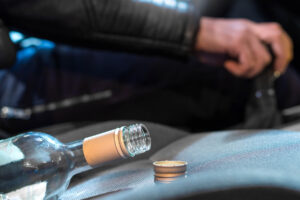When someone is arrested on suspicion of DWI and drunk driving, law enforcement will typically administer a chemical test to ascertain the suspect’s blood-alcohol content (BAC). As you probably know, a BAC of 0.08 percent is generally sufficient proof that a driver was intoxicated. But given that a test may occur several hours after an arrest, how can prosecutors–or a jury–be certain as to the defendant’s precise BAC at the time they were detained by the police?
In many Texas DWI prosecutions, the state relies on a methodology called retrograde extrapolation. Essentially, this requires an expert to calculate the defendant’s likely BAC when they were driving by accounting for the rate of absorption and elimination of alcohol from a person’s system. At some point, after you stop consuming alcohol, your body reaches its “peak” BAC, after which it starts to fall as your liver eliminates the alcohol at a slow but consistent rate.
The Texas Court of Criminal Appeals addressed the legal standards for accepting a retrograde extrapolation calculation in a 2001 decision, Mata v. State. In that case, the Court said that judges and juries must consider several factors, including the length of time between the alleged offense and when the test was administered, the number of tests given and the time between them, and any “individual characteristics” that would affect a suspect’s elimination rate for alcohol, such as their weight, gender, and the time of their last drink.
Texas Man Receives 5-Year Sentence for Intoxication Assault Following Rear-End Collision
In a more recent case, Bennington v. State, a Texas appeals court upheld a felony intoxication assault conviction based partly on retrograde extrapolation analysis. This case arose from a high-speed rear-end car accident. A U.S. Customs and Border Protection chief happened to come upon the scene. He saw the driver in the front vehicle was trapped and seriously injured. The rear driver–the defendant–spoke to the chief and said he was concerned about the other driver. The chief, who was not on duty, later testified that he believed the defendant was intoxicated.
A local police officer then attended the scene. The defendant admitted to that officer that he “had been drinking beer” and stopped around 2 a.m., less than three hours before the accident, and that he had not eaten any food the day before. A second officer then administered a field sobriety test, which the defendant failed. Based on this and other observations, the officers arrested the defendant on DWI charges. A blood test was then taken around 9 a.m., roughly seven hours after the collision. A forensic scientist with the Texas Department of Public Safety performed a retrograde extrapolation and calculated the defendant’s BAC was between 0.081 and 0.141 when the rear-end accident occurred.
A jury subsequently convicted the defendant of intoxication assault and sentenced him to five years in prison. On appeal, the defense challenged the testimony of the forensic scientist, arguing her retrograde extrapolation calculation was unreliable. The state pointed out the scientist’s testimony was clearly labeled a “scientific hypothetical” based largely on the defendant’s statement to the police about when he had his last drink before the accident.
The Court of Appeals saw no problem with admitting the expert testimony. And even without taking the retrograde extrapolation calculation into account, there was still sufficient evidence for the jury to convict the defendant of intoxication manslaughter. Texas law does not require absolute proof of a defendant’s BAC to sustain any drunk driving conviction. Rather, there must be sufficient evidence to prove, beyond a reasonable doubt, that the defendant “did not have the normal use of his mental or physical faculties at the time of the accident.”
Here, the appeals court said there were several things the defendant did to indicate he was impaired. There was the fact he rammed the other car at a high speed. He did not call 911. There was testimony from the officers at the scene who observed signs of likely intoxication. The defendant was failing the field sobriety tests. And perhaps most critically, there was the defendant’s admission that he had been drinking beer but had not eaten food the previous night. Taking all of this into account, the Court of Appeals was satisfied with the jury’s guilty verdict.
Contact Houston DWI Attorney Tad Nelson Today
It cannot be said enough: Never tell the police you were drinking. Even if you do not offer specifics, as the defendant did in the case above, that simple admission may be enough to convict you in court. Remember that you have the right to remain silent when suspected of DWI and that you have the right to speak with an attorney before answering any police questions. If you need an experienced Houston DWI attorney, contact the Law Offices of Tad Nelson & Associates today to schedule a free consultation.














